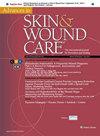伤口护理中外用杀菌剂的治疗指标:系统回顾
IF 1.7
4区 医学
Q3 DERMATOLOGY
Advances in Skin & Wound Care
Pub Date : 2025-01-01
Epub Date: 2024-10-03
DOI:10.1097/ASW.0000000000000233
引用次数: 0
摘要
摘要:慢性伤口给医疗保健系统带来沉重负担,并明显降低了患者从事日常生活活动的能力。导致伤口愈合受损的一个主要因素是细菌生物负荷。随着抗生素耐药性的增加和抗生素研发进程的放缓,替代抗菌策略显得尤为重要。本系统性综述的目的是确定从慢性伤口中常分离出的细菌种类的局部杀菌治疗指数值。治疗指数是引起哺乳动物细胞毒性的最低浓度与最低杀菌浓度的比值。数值越高,表明安全性越高,临床疗效越好。我们在 Medline 和 Embase 中进行了系统的文献检索,共收录了 37 篇报道慢性伤口中常见细菌的最低杀菌浓度及其在哺乳动物细胞中的细胞毒性浓度的文章。本研究收录的外用杀菌剂的治疗指数普遍较低,大多数在 0.5-3.0 之间。次氯酸对大肠杆菌(5.49)、金黄色葡萄球菌(6.31)和绿脓杆菌(8.81)的治疗指数值最高,而聚六亚甲基双胍对耐甲氧西林金黄色葡萄球菌(12.1)的治疗指数值最高。由于有个别证据表明存在局部抗菌药耐药性和抗生素交叉耐药性,因此局部抗菌药可能需要采用抗生素管理原则。抗菌剂的选择不应仅以治疗指数值为依据,而应根据患者的具体情况而定,并考虑到可能包括隐性感染在内的伤口愈合情况。本文章由计算机程序翻译,如有差异,请以英文原文为准。
Therapeutic Indices of Topical Antiseptics in Wound Care: A Systematic Review.
General purpose: To review the therapeutic indices of topical antiseptics for bacterial species commonly isolated from chronic wounds.
Target audience: This continuing education activity is intended for physicians, physician assistants, nurse practitioners, and registered nurses with an interest in skin and wound care.
Learning objectives/outcomes: After participating in this educational activity, the participant will:1. Explain the mechanisms underlying chronic wound physiology and their implications for effective wound healing and management.2. Evaluate the role of therapeutic index values for topical antiseptics in chronic wound management.3. Apply evidence-based treatment strategies for chronic wound management.
求助全文
通过发布文献求助,成功后即可免费获取论文全文。
去求助
来源期刊

Advances in Skin & Wound Care
DERMATOLOGY-NURSING
CiteScore
2.50
自引率
12.50%
发文量
271
审稿时长
>12 weeks
期刊介绍:
A peer-reviewed, multidisciplinary journal, Advances in Skin & Wound Care is highly regarded for its unique balance of cutting-edge original research and practical clinical management articles on wounds and other problems of skin integrity. Each issue features CME/CE for physicians and nurses, the first journal in the field to regularly offer continuing education for both disciplines.
 求助内容:
求助内容: 应助结果提醒方式:
应助结果提醒方式:


